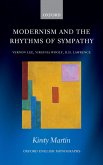This book explores the importance of sympathy as a central idea behind Victorian fiction, and an animating principle of novel reading generally. Sympathy, Brigid Lowe argues, deserves a much more important role as both a subject and a guiding principle for literary criticism.
Over the past thirty years, much literary theory has approached literature in general, and Victorian fiction in particular, in a spirit of suspicion. It has tried to purge criticism of the human subject, and of that distinctively human faculty, sympathy. Reading in a contrary, sympathetic mode, Lowe turns the tables on theoretical orthodoxy by submitting some of its central premises to the sympathetic suggestions of novels by Dickens, Gaskell, Eliot, Charlotte Bronte, Charlotte Yonge and Dinah Craik. Their explorations of such diverse issues as history, imagination, individual rights, family, and social responsibility, highlight sympathy as a cornerstone of human nature and humane conduct. Lowe argues that not only literary theory, but our culture more generally, would greatly profit by opening itself up to a sympathetic exchange of ideas with another age, and giving Victorian intimations of sympathy a sympathetic hearing.
Lowe's exploration of sympathy as part of the dynamics of reading will be of interest to academics and students working on fiction in all periods, and especially to those concerned with aesthetic and critical theory. Her investigation of the role of sympathy in a range of nineteenth-century cultural debates, in particular in relation to gender and the family, should also interest cultural historians. The engaging argumentative momentum of 'Victorian Fiction and the Insights of Sympathy' will appeal to anyone interested in why we do, and should, go on reading Victorian fiction.
Over the past thirty years, much literary theory has approached literature in general, and Victorian fiction in particular, in a spirit of suspicion. It has tried to purge criticism of the human subject, and of that distinctively human faculty, sympathy. Reading in a contrary, sympathetic mode, Lowe turns the tables on theoretical orthodoxy by submitting some of its central premises to the sympathetic suggestions of novels by Dickens, Gaskell, Eliot, Charlotte Bronte, Charlotte Yonge and Dinah Craik. Their explorations of such diverse issues as history, imagination, individual rights, family, and social responsibility, highlight sympathy as a cornerstone of human nature and humane conduct. Lowe argues that not only literary theory, but our culture more generally, would greatly profit by opening itself up to a sympathetic exchange of ideas with another age, and giving Victorian intimations of sympathy a sympathetic hearing.
Lowe's exploration of sympathy as part of the dynamics of reading will be of interest to academics and students working on fiction in all periods, and especially to those concerned with aesthetic and critical theory. Her investigation of the role of sympathy in a range of nineteenth-century cultural debates, in particular in relation to gender and the family, should also interest cultural historians. The engaging argumentative momentum of 'Victorian Fiction and the Insights of Sympathy' will appeal to anyone interested in why we do, and should, go on reading Victorian fiction.
Dieser Download kann aus rechtlichen Gründen nur mit Rechnungsadresse in A, D ausgeliefert werden.









